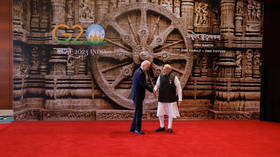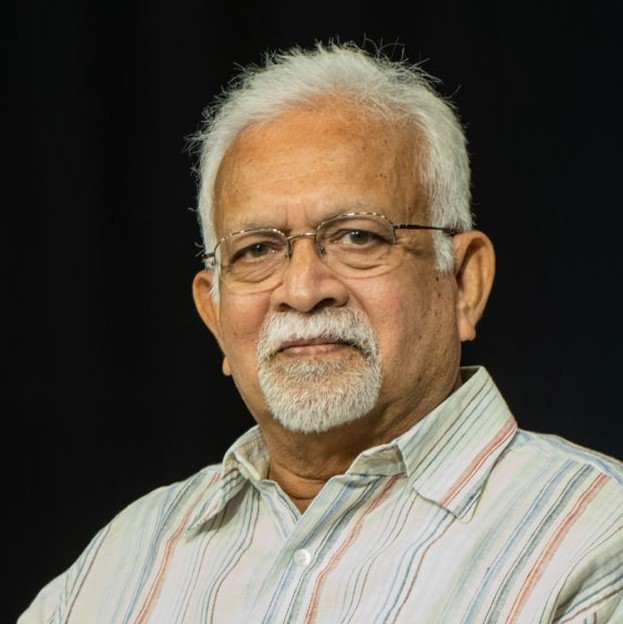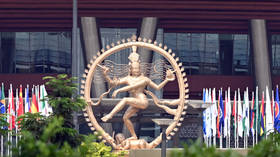US changes course on Global South, but only to retain domination
A perceived compromise on Ukraine and a rapid succession of deals with other G20 members shows Washington sees the forum as essential

The impact of the G20 Summit in New Delhi on September 9-10 is to be measured by the consensus reached regarding the conflict in Ukraine.
There is wide recognition of such an outcome as a remarkable feat that became possible largely due to a perceived climbdown by the US and the Western bloc. This is hugely consequential to international politics.
However, upon closer examination, a tantalizing question also arises: Does the Delhi Declaration’s three sentences on Ukraine, which favor Russia’s position on the conflict, signify a change in the Western approach to the hostilities and, specifically, give a certain nudge to Kiev to negotiate?
Indeed, we are witnessing a strange line-up: both Russia and the US have praised the G20 declaration, while Ukraine has complained “it was nothing to be proud of.”
In the run-up to the Delhi summit as well as during the event, there was nothing of the Russia-bashing or contrived emotional outbursts by Western leaders that they are wont to. Even the EU’s super bureaucrat, Ursula von der Leyen, was patience personified – as if on cue from Washington. The curious incident in the famous Sherlock Holmes story comes to mind: “The dog did nothing in the night-time.”
In fact, the discernible trend had already set in during US Secretary of State Antony Blinken’s atypical two-day visit to Kiev last Wednesday, and the briefing aboard Air Force One by White House National Security Advisor Jake Sullivan the very next day regarding President Joe Biden’s forthcoming sojourn in Delhi for the G20.
The White House had perhaps given a meaningful clue even earlier on August 22, when its statement announcing Biden’s visit to India underscored that “while in New Delhi, President Biden will also commend Prime Minister Modi’s leadership of the G20 and reaffirm the US commitment to the G20 as the premier forum of economic cooperation, including by hosting it in 2026.”
Suffice to say there is no question that the US wanted the G20 Summit to be a grand success – and to “empower” Indian Prime Minister Narendra Modi on the geopolitical arena as the group’s leader – once it emerged that Biden had no peer group competing for space at the gathering during his four-day visit to Delhi.
The point is, in the rapidly changing international environment, in the US calculus, the G20 has come to life unexpectedly as the only forum available today for the West (the members of the G7) to “(re)connect” with China and Russia as well as with the Global South. As BRICS began surging in giant leaps, suddenly the specter of extinction was looming over the forum.
One hallmark of the Delhi summit, in fact, is that American diplomacy moved in tandem with the BRICS troika – India, Brazil, and South Africa. The politics of it was projected by the family photo of the troika flanked by Biden on the left and the World Bank president, Ajay Banga, on the right.
Make no mistake, the US is taking an audacious course correction in its approach to the Global South, especially Africa, anchored in the geopolitical reality of the mounting challenge that China and Russia are posing by striving to monopolize that geopolitical space. Certainly, the incipient anti-colonial stirrings in Africa lately also hold dark forebodings, given their profound implications for Europe’s economic prosperity.
Thus, in rapid succession, the manifestations of a pattern of “new thinking” are emerging:
- the US-Vietnam “Comprehensive Strategic Partnership for the purposes of peace, cooperation, and sustainable development”;
- the new India-Middle East-Europe Economic Corridor (here and here);
- the Partnership for Global Infrastructure and Investment (comprising the US, European Union, France, Germany, India, Italy, Japan, Mauritius, the United Arab Emirates, Saudi Arabia, and the World Bank);
- the Lobito Corridor;
- “the new initiative with G20 partners to fundamentally reshape and scale up the World Bank to more effectively deliver poverty reduction and inclusive economic growth.”
All of the above unrolled within a space of 48 to 72 hours. The sense of urgency is palpable. The message couldn’t be any louder: the US is seeking a leadership role in the engagement with the Global South and in this paradigm shift, Biden envisages Modi as a key ally.
Of course, this has only become possible thanks to the nascent signals from Delhi in recent months of a willingness to accelerate and cement its strategic partnership with the US as a global ally, which has been at least partly a fallout from India-China tensions and a direct consequence of the Indian assessment that the Biden administration’s Indo-Pacific strategy is for real after all, and that it holds seamless potential for serving Indian interests without being confrontational with China.
Considering the huge stakes involved in the launch of this new foreign policy approach to synergize US relations with the Global South, it is not really a big deal that Biden threw Ukraine under the bus during the negotiations over the G20 declaration. He opened a pathway where tactic and strategy could coalesce in Washington’s core interests.
Consider the following:
- Ukraine has been a demanding partner all along and all good things must come to an end. Ukraine cannot and should not dictate US foreign policy priorities.
- No doubt, the failure of Kiev’s three-month-old “counteroffensive” has been on an industrial scale with around 70,000 killed in the conflict so far, according to Ukraine-favoring Western estimates. The responsibility for it – moral and political – lies largely with the US, something that cannot be hidden from world conscience any longer.
- Meanwhile, NATO countries have scrapped the bottom of their barrels for weapons stockpiles. A further pursuit of the path chasing inchoate mirages is futile and meaningless, and can only lethally wound the Indo-Pacific strategy, which can impact the global strategic balance.
- The looming Russian offensive must be stalled somehow, as its inevitable consequence will be Ukraine’s “demilitarization” and “denazification” – the conclusive eviction of NATO from Ukrainian soil and the removal of the present viscerally hostile power structure in Kiev, which serves as a proxy of the US and NATO.
- The number one priority today, therefore, is to freeze the Ukraine conflict at the present stage where Russia is yet to succeed in fulfilling its original objectives of full control of Donbass and the “demilitarization and denazification” of Ukraine – plus preventing Ukraine’s future NATO membership – while on the other hand, the Western alliance still retains the option to remain engaged with Kiev regarding the unfinished business of the war from the angle of European security.
These considerations prompted the atypical, unannounced two-day trip to Kiev on September 6-7 by Blinken with a view to transmit Biden’s twofold message that while Washington will continue to strengthen Ukraine militarily, Kiev must engage in dialogue with Moscow – consistent with the American riddle of “nothing without Ukraine.”
No doubt, this is a bitter pill to swallow for the regime in Kiev, weaned on outlandish notions of defeating Russia militarily. But what is the alternative? Ukraine is nothing but a permanent inmate in the Intensive Care Unit of America’s palliative care, and the Russian offensive will mean its asphyxiation.
Surely, there must be a lesson in all this for the G20 troika, BRICS, and the Global South. Biden has started playing hard ball to win the 2024 election.
The statements, views and opinions expressed in this column are solely those of the author and do not necessarily represent those of RT.
https://www.rt.com/india/582778-us-global-south-g20/





0 Comments:
Post a Comment
Subscribe to Post Comments [Atom]
<< Home